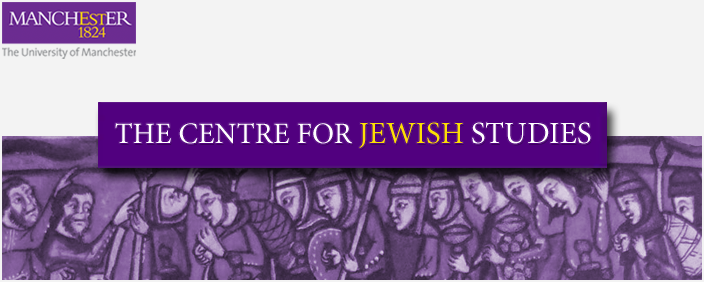MA Courses in Jewish Studies, including the Biblical World
Postgraduate Courses | Supervised Research Module
Courses in Jewish Studies at the University of Manchester are offered in a number of departments, particularly the Department of Religions and Theology. Not all courses are available every year. (You may also take 30 credits from among the other RELT-coded courses, or as directed reading courses, or from other subject areas, e.g., History, subject to the approval of your programme director.) Here is a provisional list of course units (Exact units are subject to change. See main website for provisional timetable):
RELT71152: Jews among Christians and Muslims - Prof Daniel Langton
"Jewish studies" may be understood broadly as the study of Jewish history and culture, in all its manifestations. To study it at university level is to combine the great traditions of disciplined academic research with the richness of Jewish culture and experience. This course will approach the subject from the perspective of the history of Jewish/non-Jewish relations, specifically, Jewish engagement with Christian and Islamic religious cultures, and with Western modernity. As a team taught course, it draws on expertise in modern Jewish-Christian relations, medieval Jewish-Christian-Muslim relations, European history and Holocaust Studies.
RELT70140/20140: Beginner's Hebrew (Biblical) - Mateusz Krzesinski
This course is designed to train you in reading Biblical Hebrew fluently and to familiarise you with the ins and outs of Biblical Hebrew grammar. During our weekly classes you will be taught aspects of that grammar systematically. In class and through self-study, you will have the opportunity (1) to practise your knowledge through grammatical and translation exercises and (2) to apply it through reading, translating and grammatically analysing simple texts written in Biblical Hebrew style as well as some easy (and to some extent simplified) portions from the Hebrew Bible, such as narrative ones from Genesis. The basic book for the course is Lily Kahn’s excellent and attractive The Routledge Introductory Course in Biblical Hebrew (London, 2014). By the end of the course you will be ready for an advanced course in Biblical Hebrew in which you will be trained to read the Hebrew Bible independently, applying and deepening your knowledge of its syntax and grammar.
SALC62312: Religion and Gender Theory- Dr Holly Morse
How might a student in the humanities most effectively and innovatively engage with issues relating to religion, gender, sexuality and culture? How has the development of feminist and gender theory impacted upon contemporary thinking about religion and vice versa? This unit offers students the opportunity to encounter a range of different gender and feminist theories and to consider the extent to which these can offer new insight into a range of religious traditions, texts and practices, as well as reflect on how religion has shaped conceptualisations of gender. The first half of the semester will focus on introducing students to a selection of different theoretical issues -- Gender theory; Queer theory; Gender and posthumanism; Feminist hermeneutics; Feminism and anthropology -- by focusing on the work of select theorists and their texts. In the second half of the semester, seminars will be student-led, with a member/members of the cohort analysing and reviewing a different aspect of gender theory and religion through the exploration of a case study relevant to the weekly topic. These topics will likely include, but will not be limited to: Gender, sexuality and sacred texts; Religion, gender and culture – reception; Gender and ritual; Gender and religious leadership; Gender, religion and violence.
You may be able to take 30 credits (in Religions & Theology) as a Directed Reading course unit, or upto 2 x 15 credits (in Middle Easter Studies) as a Research Essay (I and/or II). This is subject to the approval of your programme director and is also subject to the agreement of the lecturer concerned.
As well as your assessed courses, above, you may attend further MA or undergraduate MEST- or RELT-coded courses, subject to the permission of the course unit director. If you wish to be assessed on the subject of an undergraduate course, you should ask the course unit director if he or she is willing to offer additional support and assessment (normally a 6000-word essay) for you to do a Directed Reading course (RELT60612) on that subject, to be taken in conjunction with attendance at the undergraduate lectures.



